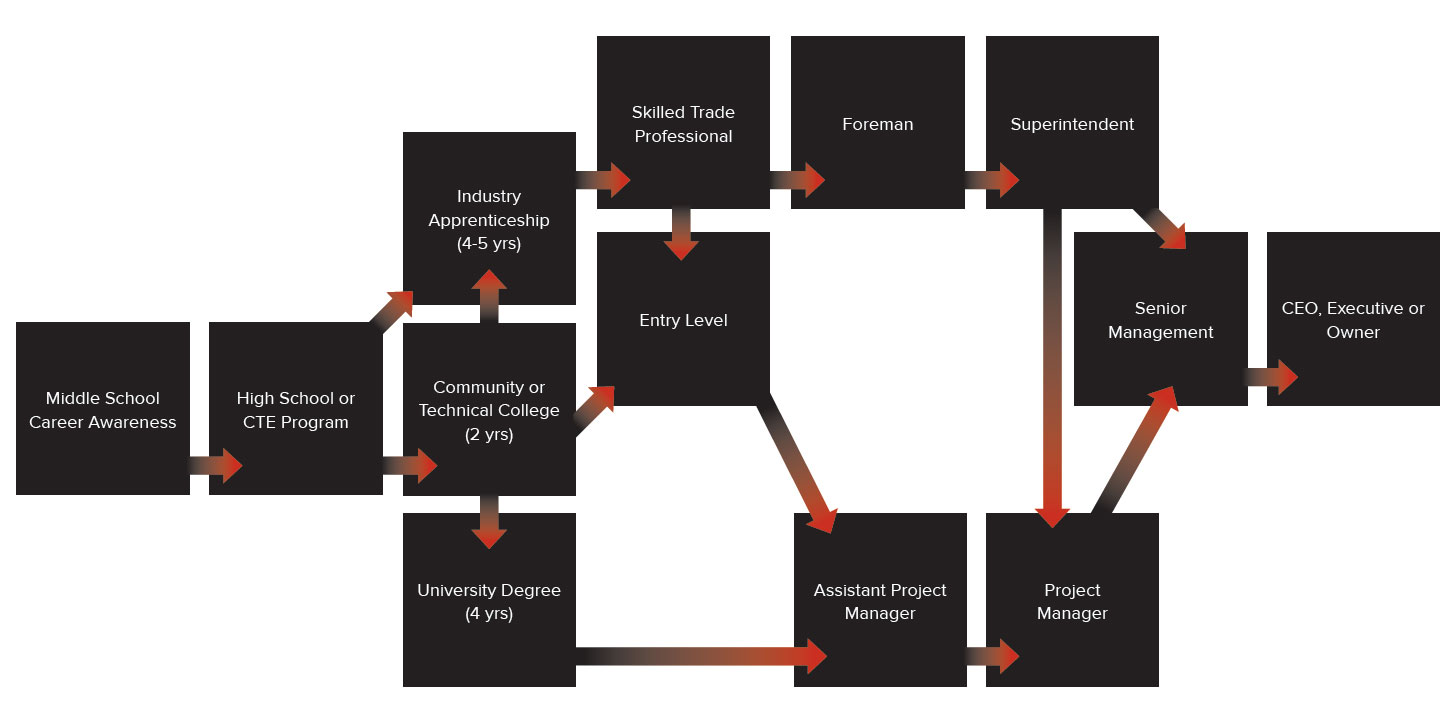Everybody Builds
GBCA is a founder and collaborative partner of Everybody Builds, an organization dedicated to diversifying Philadelphia’s construction industry. The organization connects developers and owners, contractors, and the building trades to build up sustainable diverse business growth and diverse talent recruitment, retention, and success.
Apprenticeship Opportunities
Close to 20 separate apprentice training programs are available in the Greater Philadelphia area. These typically combine on the job training with classroom instruction. To learn more about apprenticeship opportunities contact the Philadelphia Apprenticeship Coordinators Association (PACA).
Apprenticeships are available through one of the Philadelphia area building trades’ apprenticeship programs.
Visit the following sites for more information:
Carpenters
Carpenters cut, shape and install building materials in the construction of many kinds of projects. They are essential to the infrastructure you depend on daily like highways, bridges and more.
EDUCATION
Three to four years of classroom and on-the-job training.
Cement Masons
Cement masons are in charge of the finishing and treatment of concrete structures. With precision, they make sure their projects meet architectural plans for sidewalks, roads and more.
EDUCATION
Three-year apprenticeship and work in the field.
Laborers
Construction laborers are tasked with a wide range of physical jobs on building sites. Depending on the job site, a laborer’s daily tasks may vary but are important to creating structurally safe buildings, roads and other infrastructure.
EDUCATION
Two to four years of technical
instruction and on-the-job training
Ironworkers
Ironworkers erect and install structural and reinforcing steel to build metal structures like bridges, stadiums and more in today’s construction world. Their work ensures the structural safety of single and multi-story buildings.
EDUCATION
Three to four years of related technical training in classroom and shop, and on-the-job training.
Operating Engineers
Operating engineers often work with heavy equipment, a blanket term for many types of machines like cranes, bulldozers and more. Because operating engineers work with many different machineries, their skills are needed on a wide variety of job sites in industries such as highway and building construction.
EDUCATION
Three to four years of classroom and on-the-job training
Drywall Finishers
A drywall finisher meticulously completes the finishing touches on drywall panels secured to either wooden or metal frames, ensuring all surfaces are smoothed out and establishing a sturdy foundation for any structure.
EDUCATION
Three to four years of classroom and on-the-job training.
Project Managers
A construction project manager oversees building projects from start to finish, leading the team to make sure the project stays within the budget and finishes on time.
EDUCATION
Four-year bachelor’s degree
Estimators
A construction estimator determines estimates for many construction projects by reviewing the plans, visiting the construction site and estimating how much money the project will cost to build.
EDUCATION
Four-year bachelor’s degree
Superintendents
The construction superintendent supervises the project from start to finish. Depending on the size of the project, their role may vary, but they make sure the project stays within the budget and complies to regulation requirements.
EDUCATION
Four-year bachelor’s degree
Project
Supervisors
Construction project supervisors are responsible for managing a project’s plan. They act as a middleman between other supervisors and management to make sure projects are completed in time.
EDUCATION
Four-year bachelor’s degree
Project
Engineers
Project engineers manage the technical aspects of the job, translating the blueprints and making sure the project has the right materials, equipment and workers to execute the construction work.
EDUCATION
Four-year bachelor’s degree
Electricians
Electricians install, maintain, and repair electrical systems in homes, businesses, and construction sites. They work with power, lighting, and control systems to keep buildings running safely and efficiently.
EDUCATION
Five-year apprenticeship and work in the field
Plumbers
Plumbers are responsible for installing and maintaining piping systems. They make sure water, gas, and drainage systems work safely in homes, buildings, and job sites.
EDUCATION
Five-year apprenticeship, on-the-job training,
Glaziers
Glaziers and glassworkers install, cut, and fit glass for windows, doors, curtain walls, and facades in commercial and residential buildings.
EDUCATION
Three-to-four-year apprenticeship, on-the-job training, and classroom instruction
Insulators
Insulators oversee installing and applying materials that control temperature and sound. They make sure buildings and systems are energy efficient and meet safety standards in all types of environments.
EDUCATION
Five-year apprenticeship
Pipefitters
Pipefitters are in charge of assembling and installing piping systems for heating, cooling, and industrial use. They work to ensure their systems meet project specifications for buildings, plants, and other complex structures.
EDUCATION
Five-year apprenticeship and on-the-job training
Sheet Metal Workers
Sheet metal workers fabricate and install metal for buildings and systems. They shape and fit materials for ductwork, roofing, siding, and kitchen equipment. Training includes HVAC, sheet metal fabrication, and metal installation.
EDUCATION
Four-to-five-year apprenticeship, on-the-job training, and classroom instruction




